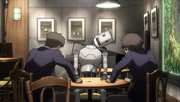Review for Time of Eve: The Movie Deluxe Edition Blu-ray + Soundtrack
Introduction
I’m strangely old fashioned and slow to change, especially when it comes to money. It took me years, and several hundred pounds paid in high street premiums before I finally discovered the joys and bargains of Internet shopping, and I still tend to stick with the e-tailers that I know, rather than try someone new. I’m yet to work up the gumption to trust e-Bay or Paypal and then there is the mysterious black box that is the crowd funding movement, where customers invest directly in the products that they want, instead of waiting for the usual process of development, advertising and the like. From what I have seen, for every Kickstarter that succeeds, ten fall by the wayside, and of those ten, eight were patently daft ideas in the first place. But once in a while, a Kickstarter will deliver something special, and it’s even better when those releases get to retail. I’ve already reviewed Yoshiura Yasuhiro’s Patema Inverted, which Anime Limited kickstarted to a feature packed ultimate edition, and now I turn my attention to his earlier work, Time of Eve, which also received a crowd funding genesis.
Those of you with long memories might remember me waxing lyrical about this original net animation when it was first streamed on Crunchyroll. It debuted in the form of five 15-minute episodes and a double length final episode, bringing to life a future world of humans warily coexisting with robots, through the lens of a unique cafe where the traditional boundaries between man and machine are blurred. That series got a Blu-ray release in Japan, with the added incentive of English subtitles, although the price and the added hassle of importing from Japan did give me pause. It was enough of a pause for Yoshiura Yasuhiro to turn his net streamed series into a full on theatrical movie, linking the six stories together in a larger narrative framework. And when it came to releasing that, the Pied Piper company in the US came together to crowd fund the release, opting to judge fan opinion by their willingness to invest. The resulting package of on disc and physical extras released to general retail is an indication of how much fans wanted this movie. Kickstarter investors got even more than what you can buy at retail, and this release offers far more than the usual anime title.
It’s a near future, where robots are ubiquitous, and in appearance the new models are indistinguishable from humans, except for a mandatory holographic halo that must be projected at all times. With robots getting smarter and more realistic, human society’s relationship with its machines is under greater scrutiny than ever before. How do you relate to something that for all intents and purposes, looks human? There’s a puritanical backlash against robots taking jobs and usurping human relationships, and many treat their robots like appliances, deriding those who do otherwise.
Rikuo’s a schoolboy who’s dangerously close to treating his robot Sammy with respect, something his sister is quick to point out, and his best friend Masaki warns him about. But there’s something up with Sammy, when Rikuo discovers an oddity in her log file, a simple English phrase nestled in the hex code, “Are you enjoying the Time of EVE?” He and Masaki decide to investigate, and follow the directions in Sammy’s GPS log to an unassuming door. The door leads to an underground cafe called Time of EVE, and it has just one rule for its patrons, no discrimination between robots and humans. Why would Sammy go to a cafe like that? When they go inside, it looks as if there are only humans inside, an enigmatic barista, a gregarious girl, a playful child and her elderly guardian, a besotted couple, and a quiet loner. But then the penny drops. If there are robots in there, they’ve all turned their haloes off. But this is the kind of grey zone that the puritans want to shut down...
Picture
Time of Eve gets a 1.78:1 widescreen 1080p transfer on this Blu-ray and it is gorgeous! I saw no flaws worth mentioning, nothing in the way of compression or aliasing, and not even any digital banding, something that anime is particularly prone to even in HD. It’s well worth the quality transfer, as Time of Eve is a lush, divine animation. The world design is detailed and complex, recognisably similar to our own, but given enough of a twist (holograms and the like) to make it a near future world. The character designs are memorable and consistent, while the post-production to the anime, in terms of lighting effects and so forth, make it a warm and vibrant viewing experience. Given that Time of Eve is essentially a talking heads drama, with little in the way of action, it’s a remarkably fluid and effective animation.
Sound
You have the choice between PCM 2.0 Stereo Japanese, a PCM 2.0 English dub (thank you kickstarters), and subtitles in English, Spanish, French, German, Italian, Portuguese, Russian, Japanese, Chinese, and Hebrew, the latter for the feature and short animations only (once again thanks to the kickstarters for the sub cornucopia). The dialogue is clear throughout, and the audio has good immersive presence in the stereo mix, especially when pro-logicked up. The music really is something special for this animation, and it’s well worth the soundtrack CD being included in the package. It really suits the film well, and drives the emotion of the story without feeling obvious. The dub too is very strong, and this is one film that I can watch in either language. Time of Eve is comprehensively subtitled, imaginatively so at times given the prevalence of on screen text, and I ought to mention that there is an English signs only track to go with the English dub.
Extras
I got the International Release Deluxe Edition of Time of Eve, but all that means is a loose blurb sheet wrapping around the bottom of the package with a list of contents and a BBFC logo. You get a sturdy card slipcase, Blu-ray Amaray sized in two dimensions, but thick enough to contain the book, and a fold-out digi-pack which holds the Blu-ray and the Soundtrack CD on opposing trays.
The Blu-ray boots up very quickly to an animated menu. At the end of the film, there is a further 1:54 English credit reel.
A really sweet bonus is that you get the director’s two short animations as well on the disc. They’re presented in 1080p but look upscaled in quality.
Short Film: Pale Cocoon is a story of a researcher in a subterranean community, trying to find records of human society before its decline, and in the process uncovering an amazing secret. This lasts 22:54.
Short Film: Aquatic Language lasts 9:07, and we meet a young man in a cafe, drowning his sorrows following a break-up, getting some unusual advice from the barista.
These are interesting animations, entertaining certainly, but you can also see the seeds of Time of Eve, and Patema Inverted in both of them.
Time of Eve gets an audio commentary from Rina Sato (Nagi), Kenji Nojima (Masaki), and director/writer Yasuhiro Yoshiura. It’s an interesting and informative commentary track, pointing out the differences in the movie version.
You get the trailer for the film.
The Sign Gallery is a 38:03 slideshow, or you can click through the 19 images. Some scenes were so dense with on screen text that not all of it could be translated, or dialogue had to take priority. Those scenes are presented here in static image form, so that the text can be translated and read at your leisure.
The rest of the extras are presented in 1080i format.
Opening Day lasts 11:31, and offers the two stage sessions for the premiere of the movie, where the director and voice actors were on stage for a little Q&A presentation.
Behind the Scenes lasts 6:41 and is a whistle-stop tour of the film making process from the first ADR session to the eventual theatrical release.
There are interviews with the voice actors, Jun Fukuyama (Rikuo – 8:21), Rie Tanaka (Sammy – 5:40), Rina Sato (Nagi – 7:53), and Kenji Nojima (Masaki – 6:48) which look at their experiences in making the film, as well as a coffee taste test in one instance. These are obviously Japanese promotional materials translated for this release.
The interview with Yasuhiro Yoshiura on the other hand has been created especially for this Blu-ray. It lasts 16:10 and in it he answers selected questions submitted by the kickstarter backers.
A sweet addition to this set is the Soundtrack CD, featuring 33 tracks with a total runtime of 38:16. It also has the end theme from the ONA as well as the end theme from the film.
Then there is the 56 page booklet, CODE:LIFE – The Third Generation of Artificial Intelligence. It’s rich with interviews with the director, the producer and some of the other artists that worked on the project. There’s a piece on the soundtrack, with a CD track listing, and an interview with the composer. Finally, and most engaging of all is the short story at the end of the book, a prequel for Time of EVE.
Conclusion
The best robot story that Isaac Asimov never wrote!
Actually, I doubt very much that Asimov could have written Time of Eve, although it feels very much like an Asimov worldview, with his famous Three Laws of Robotics quoted on occasion, obeyed by this story’s robots, and in one plot even key to the way it plays out. I love Asimov stories, and have great appreciation for his robot fiction, but his forte was the detective mystery, and when it comes to his writing of interpersonal relationships, I always get the feeling that he thought of them as necessary evils in his fiction. Time of Eve is all about interpersonal relationships, relationships between people, and more importantly the relationships that develop between people and their robots in this brand new world.
Like all good Asimov stories though, it begins with a mystery, an enigmatic entry in an android’s log file. Sammy is the android that belongs to Rikuo’s family, and it’s the mention of Time of EVE that starts him and his best friend Masaki investigating Sammy’s movements. That leads them to the titular bar where there’s not supposed to be any discrimination between androids and humans.
It’s an uncertain, near future world, where androids are only now becoming commonplace, and society is re-examining how people interact with them, with what are basically appliances. At least that’s the way it seems, with robots conditioned to merely protect humans, obey orders, and protect themselves in that order. They’re not supposed to have free will, and they should have even less personality than Siri. That’s because elements in society, particularly the Ethics Committee insist that androids should never threaten to replace genuine human relationships, so someone ‘daft’ enough to thank an appliance for doing what you want it to is derided as android-holic. It’s common to see people simply ignoring their androids, and at worst being abusive to them. After all, it’s just an appliance.
Except what if the androids have a degree of free will, a degree of creativity? Sammy’s unexpected detour, and in one instance acting without a direct order are enough to get Rikuo and Masaki investigating, and following her footsteps leads them to the Time of Eve cafe. With the announcement that there’s no discrimination allowed between human and robot, it instantly provokes thought. Just which of the customers is human, which is robot, and if you don’t know, how do you relate to them? With the android free of the restraint that has them acting machine-like in public, it becomes even more difficult, when it appears that they have simulated personalities. And given society’s treatment of androids, it adds a sense of taboo, of danger to the cafe’s very existence.
Time of Eve was originally six very separate episodes, but through careful editing, and the creation of a larger story framework, it works exceedingly well as a movie, with the film feeling like it has a six-act structure, rather than individual stories. Each encounter that Masaki and Rikuo have in the cafe takes them further on their respective journeys of growth, although not necessarily in the same direction. Rikuo finds that the way that he relates to Sammy is challenged, while Masaki’s experiences are coloured by his father being on the Ethics Committee, as well as the primitive robot care-giver that looked after him after his parents divorced.
Time of Eve is a thought provoking and entertaining sci-fi, which will certainly make you reconsider just how we interact with our technology. We may not have humanoid robots in every home, but when software like Siri and Cortana are becoming ever more intelligent and responsive, you have to wonder if we should start being respectful of our appliances. But like any decent sci-fi, Time of Eve also works as an allegory, in this case for discrimination as a whole. The main characters are forced to view the world without the blinkers that society imposes, and as you might expect, they soon learn that it’s the similarities between people that are more important than the differences. You might be forgiven for thinking that Time of Eve is a dry experience. Nothing could be further from the truth, as it’s a delightfully funny film as well, with some great character moments, and for sci-fi fans, plenty of references to other movies and fiction. And at best, it can be truly heartfelt and moving too. You get engaged with the characters and start rooting for them, hoping that they can work out their issues and improve their relationships.
Time of Eve is a great film, which takes what was best about the web series, and enriches it with back story, character development and motivation. You learn more about how this world came to pass, and why a cafe like Time of Eve needs to exist at all. In this regard, the short story in the booklet is as essential an extra as I have ever seen in an anime release. I loved the show when I watched it streamed, and the film is even better. You should very much seek a copy out.















































































Your Opinions and Comments
Be the first to post a comment!